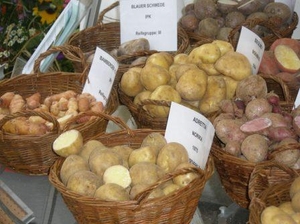Potato flower

Chair
Veli-Matti Rokka
veli-matti.rokka@luke.fiConfirmed as Chair for Phase X in March 2019
Vice-Chair
Pawel Chrominski
pawel.chrominski@nordgen.org
Grant Scheme Activity
Phase X
| Sixth Call (2022) |
Working Group activities and related events
March 2024
The kick-off meeting of the EURO-POTATOES Activity was held in Młochów and Radzikow, Poland from 19-20 March 2024. The meeting also played a role in revitalizing the efforts of the Potato Working Group. For more information, visit the EURO-POTATOES page.
February 2023
The EURO-POTATOES Activity, submitted for funding under the Sixth Call of the Phase X ECPGR Activity Grant Scheme, was selected by the Executive Committee and approved in February 2023.
September 2018
European project ECOBREED: Increasing the efficiency and competitiveness of organic crop breeding
ECOBREED will improve the availability of seed and varieties suitable for organic and low-input production. Activities will focus on four crop species, selected for their potential contribution to increase competitiveness of the organic sector: buckwheat, wheat, potato and soybean.
The project will develop (a) methods, strategies and infrastructures for organic breeding, (b) varieties with improved stress resistance, resource use efficiency and quality and (c) improved methods for the production of high quality organic seed. [more]
February 2018
European Cultivated Potato Database (ECPD)
The newly refreshed site of the ECPD is now live. The site retains many of the features that users of the previous site will be familiar with, including all the botanical and disease data provided by institutes throughout Europe.
As part of the refresh the database managers at Science and Advice for Scottish Agriculture (SASA) have taken the opportunity to integrate the data from the “botanical” database used within SASA for the purposes of Distinctness, Uniformity and Stability (DUS) testing in potato and based on UPOV Guidelines and CPVO Protocols. Users will therefore see two character sets within the new database as well as a different range of material, with the ECPD element continuing to focus on genetic resource varieties whilst the “botanical” element covers varieties passing through DUS.
October 2014
The AEGIS Competitive Grant project ‘Identification of old potato clones having unreliable variety names by means of fingerprinting using microsatellite (SSR) markers to assist in setting up the AEGIS collection for potato cultivars’ has been finalized and its report placed on the AEGIS Grant Scheme webpage.
The aim of the project was to use microsatellite genotyping to assist in setting up the AEGIS collection for potato cultivars by means of fingerprinting old potato clones with questionable identity, to confirm or correct their cultivar names. Out of approximately 9,000 Solanum tuberosum accessions included in EURISCO a total of 379 accessions from eight countries were genotyped with 12 SSR markers. Three recommendations had been made, including the use 9 out of the 12 markers that had been used in the AEGIS study and thus to contribute to the establishment of a central SSR-fingerprint database. Link to the AEGIS Potato Project webpage
Working Group operative documents
- Working Group Chair’s report for Phase IX (prepared for the Fifteenth ECPGR Steering Committee Meeting) (see here)
- Progress Report Phase VII (2002-2006) (41,8 KB)
Background information

The ECPGR Potato Working Group was established in 1998, following a request submitted by the coordinator of the EU project RESGEN - CT95 - 34/45 on "Genetic resources of potato, including conservation, characterization and utilization of secondary potato varieties for ecological production systems in Europe". The goals proposed for the Working Group consist in coordination and extension of potato genetic resources conservation activities initiated by the EU project:
- Further development of the central databases on potato varieties and on wild potatoes
- Improvement of health status of potato genetic resources
- Characterization/evaluation of potential genetic resources for quality traits and resistance against pests and diseases
- Rationalization of potato collections included in the Network
- Sharing of material and results
The Working Group met for the first time in Wageningen, The Netherlands in March 2000, jointly with the final meeting of the EU project.
Related Information
Other Working Group documents and publications
Useful links
- Commonwealth Potato Collection
- Crop Trust - Conservation strategies
- ECPGR Central Crop Database forPotato
- EU project RESGEN - CT95 - 34/45 - Genetic Resources of Potato including conservation, characterization and utilization of secondary potato varieties for ecological production systems in Europe
- Potato Portal developed by CGN